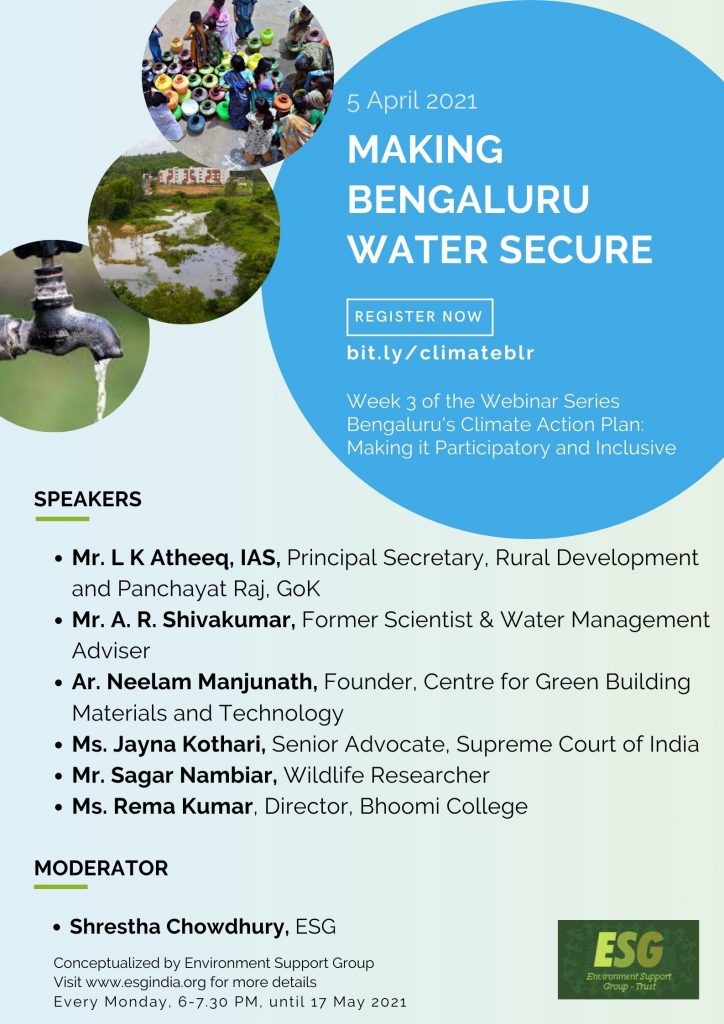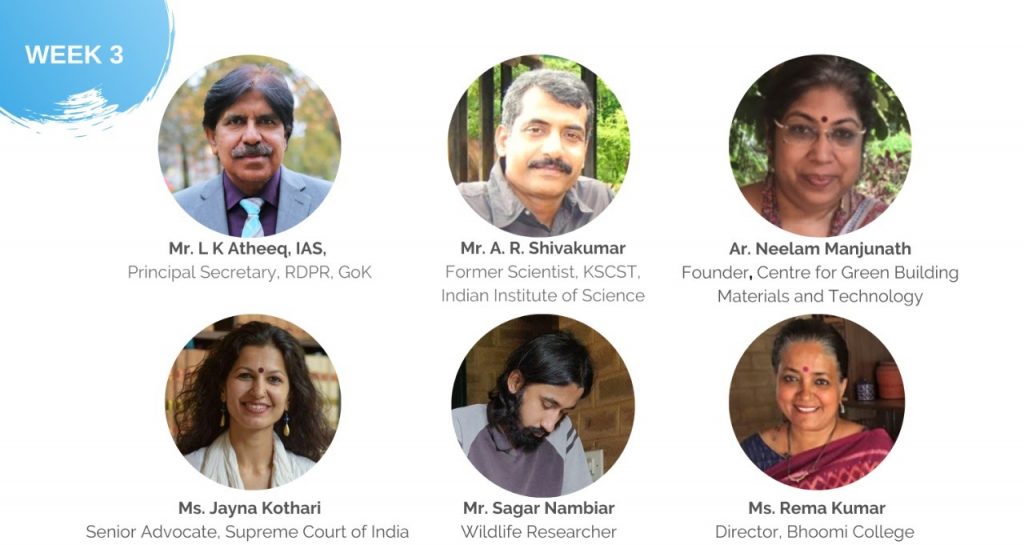Week 3: Making Bengaluru Water Secure
Date: 5th April 2021, Monday, 6:00 PM India on Zoom
Pls note: Registration is not required if you have already enrolled for the webinar series.

Overview
Bengaluru’s insatiable demand for water has not only exhausted its replenishable ground water reserves, and overdrawn its share of the Cauvery, but now plans are afoot to extract water from the far away Sharavathi river. Meanwhile, the acute financialization of land sans rigorous and democratic land use planning has resulted in lakes and other water commons that once sustained the city’s water needs being cannibalised. Most lakes are comprehensively polluted and substantially encroached, and biodiversity loss in wetlands has been substantial in the past decade alone. Water that flows into the city is of drinking water quality, and water sent out is so polluted that farmers fall sick and food grown in them is contaminated, and supplied back to the city. The supply and distribution of drinking water is reflective of socio-economic disparities, with the working classes and urban poor having to invest heavily (in terms of money and time) to secure a few buckets of water, whilst private swimming pools are increasingly common. Efforts to promote rainwater harvesting have not taken off as intended and the question looming large is how the metropolis can survive by its prevailing high energy extraction of water from deep down under and far away rivers as the population tips closer to the 2 crore mark. Adapting Bengaluru to the changing climate–with its implications on varying rainfall patterns and thus on groundwater availability–thus requires concerted efforts towards building water security.

Profiles
1.Mr. L K Atheeq, IAS, Principal Secretary, Rural Development and Panchayat Raj, GoK
Mr. Atheeq is a senior civil servant of Karnataka with 30 years of experience. He is currently the principal secretary of Rural Development and Panchayat Raj Department. He has earlier held positions like principal Secretary to the chief minister of Karnataka and joint secretary in the Prime Minister‘s office. He has also worked as State Project Director of Sarva Siksha Abhiyan, Director of Karnataka Rural Water Supply & Sanitation Agency. He is passionate about sectors like decentralization, rural development, natural resources management, health & education. He has travelled extensively and has deep interest in poetry & music.
2. Mr. A. R. Shivakumar (Former Scientist, KSCST, Indian Institute of Science )
A former scientist at the Karnataka State Council of Science and Technology (KSCST) at Indian Institute of Science (IISc), Mr. Shivakumar is a vociferous proponent of Rain Water Harvesting, and he has been relying entirely on collected rainwater to serve all his family’s needs for over two decades. Over the years, Mr. Shivakumar has designed and implemented hundreds of rainwater harvesting projects in Bangalore, including at Vidhana Soudha, the Karnataka High Court. He has been honoured with several awards like central government’s National Innovation Award, Karnataka government’s Ammulya award etc. He has also played a key role in getting the Karnataka government to pass an amendment to the (BWSSB) Act that made rainwater harvesting compulsory for houses and offices with an area greater than 2,400 sq. ft. in the core of Bengaluru.
3. Ms. Jayna Kothari, Senior Advocate, Supreme Court of India
Ms. Kothari is an alumnus of Oxford University and a Senior Advocate practising in the Karnataka High Court and the Supreme Court of India. She is also the co-founder and Executive Director of the Centre for Law and Policy Research. Her research and practice interests include constitutional law, gender and sexuality law, disability rights and discrimination law.
4. Ar. Neelam Manjunath, Founder, Centre for Green Building Materials and Technology
Ar. Neelam Manjunath is an architect, planner, scientist, activist and theoretician. She is also the Bamboo Ambassador of India. She has 30 years of experience in the field of Sustainable Architecture and Technologies. Her architecture is distinguished for the use of low energy materials and technologies with special emphasis on the use of Bamboo. A champion of resource equity on this planet, she founded Centre for Green Building Materials and Technology (CGBMT) with the aim of building awareness and providing Eco-education to promote Sustainable living which is a prerequisite for mitigation of Global warming.
5. Sagar Nambiar, Wildlife Researcher
Mr. Sagar has a degree in environmental science from St.Joseph’s College, Bangalore. He has been part of several research projects in the Western Ghats and is currently in the Andamans learning to become a Divemaster to participate in coral reef restoration. He has been using a grey water treatment system along with rain water harvesting for the last seventeen years at his residence in Bangalore.
6. Rema Kumar, Director, Bhoomi College, Bangalore
Ms. Rema is the current Director of Bhoomi College. She is an educationist with over two decades of experience. She has been involved with Prakriya Green Wisdom School, Bengaluru since its initial years. She held the roles of Principal and Director of the school before moving on to Bhoomi Network. She has a passion and commitment to institution building processes, enabling individuals to tap into their potential to build learning communities. She also has a keen interest in issues of deep ecology and the art of using stories to connect ideas and people.

